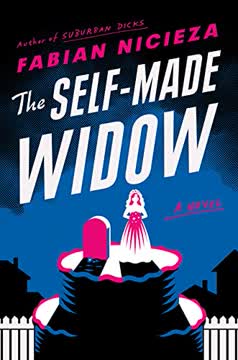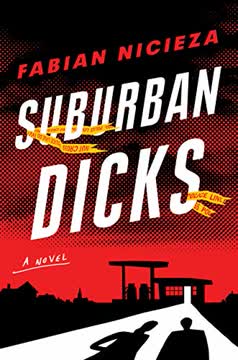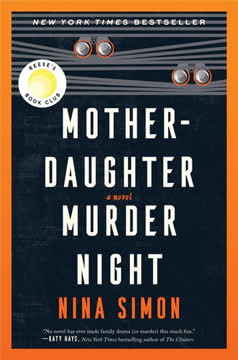Plot Summary
Suburban Death, Suburban Secrets
Derek Goode, a successful lawyer and family man in affluent West Windsor, New Jersey, dies suddenly in his sleep. His wife, Molly, is composed and efficient, calling paramedics and friends with a chilling lack of emotion. The police, paramedics, and a circle of close friends—Andrea Stern, Crystal Burns, and Brianne Singer—gather at the Goode home, each reacting to the tragedy in their own way. Andrea, a former investigative prodigy turned suburban mom, is immediately suspicious of the circumstances, sensing that beneath the veneer of suburban perfection, something is deeply amiss. The death, ruled a heart attack due to Derek's known heart condition, sets off a chain of events that will unravel the secrets of the community.
The Widow's Smile
Molly Goode's reaction to her husband's death is unsettlingly calm, even as her friends and children grieve. At the memorial and funeral, she is the picture of control, her emotions tightly managed, her home quickly purged of Derek's presence. Andrea, observing Molly's behavior, notes the lack of genuine grief and the almost clinical efficiency with which Molly moves on. The community whispers, but most accept the official story. Only Andrea, haunted by her own past as a crime-solver, can't let go of the feeling that Molly's smile hides something sinister.
Friends, Frenemies, and Foes
Andrea's circle of friends—the self-dubbed "Cellulitists"—are bound by shared experiences of motherhood, marriage, and suburban life, but their relationships are fraught with rivalry, secrets, and judgment. Crystal is the gossip, Brianne the conflicted confidante, and Molly the enigmatic queen bee. As Andrea probes into Derek's death, the group's dynamics shift, with trust eroding and old wounds resurfacing. The investigation becomes as much about the nature of female friendship and competition as it is about solving a possible crime.
The Cellulitists' Web
Andrea's investigation reveals that each member of her friend group is hiding something: affairs, financial troubles, marital dissatisfaction, and personal regrets. Derek's death exposes the cracks in their marriages and the lies they tell themselves and each other. The Cellulitists' web of secrets becomes both a source of clues and a barrier to the truth, as Andrea must navigate their shifting allegiances and protect her own family from collateral damage.
A Heart Attack, or Not
Though Derek's heart condition provides a plausible explanation for his death, Andrea's instincts tell her otherwise. She uncovers evidence of Derek's risky behavior—affairs, drug use, and involvement in a shady financial scheme with other local husbands. The possibility that Molly exploited Derek's vulnerabilities to orchestrate his death becomes increasingly likely. Andrea's pursuit of the truth puts her at odds with the police, her friends, and even her own husband, Jeff, who may be implicated in Derek's illicit activities.
The Anonymous Accusation
Kenny Lee, a journalist and Andrea's former partner in crime-solving, receives an anonymous call: "Molly Goode killed her husband." This tip galvanizes Andrea and Kenny to dig deeper, using their respective networks and investigative skills. The call also signals that someone close to the case knows more than they're saying, and that the web of complicity may extend beyond Molly and Derek.
Digging into the Past
Andrea's investigation leads her to examine Molly's past, including her estrangement from her siblings and the suspicious circumstances of her parents' deaths years earlier. Patterns of manipulation, control, and calculated risk-taking emerge, suggesting that Molly is capable of far more than anyone suspects. Andrea's own history as a child grifter and amateur detective gives her unique insight into Molly's psychology, but also forces her to confront her own choices and regrets.
Marriages and Motives
The novel explores the dark underbelly of suburban marriage: the compromises, betrayals, and simmering resentments that can fester behind closed doors. Derek's affairs and financial schemes, Molly's need for control, and the other husbands' complicity all provide possible motives for murder. Andrea's marriage to Jeff is also tested, as his involvement in Derek's fraud comes to light. The question becomes not just who had reason to kill, but who had the will and the means.
The Fraudulent Fortune
Andrea and Kenny uncover a complex Medicare fraud involving Derek, Jeff, Martin Singer, and a shadowy broker named Pettigrew. The scheme uses the identities of elderly residents to launder millions of dollars through fake trades. Molly, discovering the scam, manipulates events to her advantage, ensuring she can access the money after Derek's death. The fraud provides both motive and means for murder, and its unraveling threatens to bring down multiple families.
The Children's Burden
As the investigation intensifies, the children of the main characters—especially Henry and Brett Goode, and Andrea's own kids—are caught in the crossfire. Ruth, Andrea's daughter, is threatened by someone trying to derail the investigation, and Henry faces the prospect of losing both parents. The novel poignantly explores the impact of adult choices on children, and the ways in which the next generation inherits the consequences of their parents' actions.
The Perfect Alibi
Molly's genius lies in her ability to anticipate every move: she plants evidence, manipulates witnesses, and even engineers the exhumation of Derek's body to ensure the official cause of death is ruled as drug-induced heart failure. She sacrifices a multimillion-dollar insurance payout to avoid suspicion, confident that the real prize—the stolen fortune—is within her grasp. Andrea realizes that to catch Molly, she must think like her: not just proving guilt, but predicting her next move.
The Trap is Set
With the help of the FBI and her friends, Andrea orchestrates a sting to catch Molly as she attempts to flee the country with her children and the stolen money. The operation is meticulously planned, using surveillance, wiretaps, and psychological pressure to force Molly's hand. In a final confrontation, Andrea and Molly face off, each recognizing the other as a worthy adversary. Molly's arrest is both a victory and a tragedy, as the cost of justice becomes clear.
The Fall of Molly Goode
Molly is arrested for embezzlement and fraud, but the murder charges prove difficult to make stick. Her confession is oblique, her alibi nearly perfect, and the evidence circumstantial. Nevertheless, her web of lies unravels, and she is brought down by the very control and cunning that once protected her. The community is left to reckon with the fallout: broken families, lost friendships, and the realization that evil can wear a friendly face.
Aftermath and Reckoning
In the wake of Molly's arrest, the Cellulitists are fractured, marriages are tested, and the children must adapt to new realities. Andrea's marriage to Jeff collapses under the weight of his betrayal, and she is forced to confront her own role in the events. The novel ends with a sense of both closure and uncertainty, as the characters grapple with the consequences of their actions and the possibility of redemption.
The Cost of Truth
Andrea's relentless pursuit of the truth comes at a high price: her marriage, her friendships, and her peace of mind. She is both celebrated and resented for her role in exposing the crimes, and must live with the knowledge that doing the right thing can hurt the people she loves. The novel asks whether justice is worth the cost, and whether it is possible to balance personal happiness with moral responsibility.
New Beginnings, Old Wounds
As the dust settles, the characters begin to rebuild their lives. Andrea finds strength in her children and her friendship with Sathwika, while Kenny and Sitara face the challenges of their own relationship. The community is forever changed, but the possibility of healing and growth remains. The novel ends on a note of cautious optimism, acknowledging that while the past cannot be undone, the future is still unwritten.
Characters
Andrea Stern
Andrea is a former child prodigy and amateur sleuth whose investigative instincts never left her, even as she settled into suburban motherhood. Sharp, sarcastic, and deeply perceptive, she is both admired and resented by those around her. Andrea's drive to uncover the truth is fueled by guilt over her brother's death and a sense of moral responsibility. Her marriage to Jeff is strained by his secrets and her own restlessness. Throughout the novel, Andrea evolves from a passive observer of her own life to an active agent of change, willing to risk everything for justice—even if it means losing her family and friends.
Molly Goode
Molly is the epitome of suburban perfection: beautiful, organized, and seemingly unflappable. Beneath the surface, she is a calculating, ambitious woman with a dark past and a capacity for ruthlessness. Her need for control drives her to orchestrate her husband's death and manipulate those around her. Molly's relationships are transactional, and she views others as tools to be used or obstacles to be removed. Her downfall is both a result of her brilliance and her inability to trust anyone fully. Psychoanalytically, Molly embodies the dangers of unchecked ambition and the corrosive effects of living a lie.
Jeff Stern
Jeff is Andrea's husband, a financial advisor with a history of ethical lapses. He is both supportive and undermining, loving and self-serving. His involvement in Derek's fraud scheme and his repeated betrayals strain his marriage to the breaking point. Jeff's character arc is one of gradual unraveling, as his attempts to provide for his family through shortcuts ultimately lead to his downfall. He represents the pressures of suburban masculinity and the temptation to compromise one's values for success.
Kenny Lee
Kenny is a Pulitzer-winning reporter and Andrea's former investigative partner. Driven by a need for recognition and redemption, he is both brilliant and insecure. His relationship with Sitara is complicated by his emotional immaturity and fear of commitment. Kenny's role in the story is both as investigator and chronicler, providing an outsider's perspective on the insular world of West Windsor. He is both a catalyst for the investigation and a mirror for Andrea's own struggles with identity and purpose.
Crystal Burns
Crystal is the quintessential suburban gossip, always in the know and eager to share. Her warmth and generosity are genuine, but she is also deeply insecure and desperate for validation. Crystal's role as the group's connector makes her both indispensable and resented. She is ultimately loyal, but her need to be liked sometimes blinds her to the truth.
Brianne Singer
Brianne is Andrea's closest friend among the Cellulitists, but their relationship is fraught with unspoken tensions. Smart but passive, Brianne is caught between loyalty to her friends and her own desires. Her affair with Derek and complicity in the fraud scheme make her both victim and perpetrator. Brianne's journey is one of self-discovery, as she is forced to confront the consequences of her choices.
Martin Singer
Martin is Brianne's husband, a manager of assisted living facilities and a key player in the Medicare fraud. He is quiet, risk-averse, and easily manipulated by stronger personalities. Martin's complicity in the scheme is driven by financial pressures and a desire to please, but he is ultimately overwhelmed by guilt and fear. His relationship with Brianne is strained by mutual dissatisfaction and secrets.
Wendell Burns
Wendell is Crystal's husband, a steady but uninspired man who avoids conflict and risk. He is the only one of the husbands to refuse involvement in Derek's scheme, serving as a quiet counterpoint to the others' moral failings. Wendell's role is minor but significant, highlighting the importance of integrity and the costs of complicity.
Sathwika Duvvuri
Sathwika is Andrea's closest confidante outside the Cellulitists, a crisis management specialist with a keen understanding of human behavior. She provides emotional support and practical advice, helping Andrea navigate the investigation and her personal life. Sathwika's presence is a stabilizing force, and her friendship with Andrea represents the possibility of genuine connection and growth.
Molly's Children: Henry and Brett Goode
Henry and Brett are Molly and Derek's sons, caught in the maelstrom of their parents' secrets and crimes. Sensitive and perceptive, they bear the emotional burden of their family's collapse. Their experiences underscore the novel's central theme: that the sins of the parents are visited upon the children.
Plot Devices
Dual Narrative Structure
The novel employs a dual narrative, alternating between Andrea's first-person investigation and Kenny's third-person journalistic pursuit. This structure allows for multiple viewpoints, contrasting the insular, emotionally charged world of the Cellulitists with the detached, analytical approach of the Muckrakers team. The interplay between these perspectives creates dramatic irony, as the reader is often privy to information that the characters are not, heightening suspense and engagement.
Foreshadowing and Red Herrings
Nicieza skillfully plants clues and red herrings throughout the narrative, using foreshadowing to build tension and misdirection to complicate the investigation. The initial focus on Derek's heart condition, the anonymous tip, and the various suspects' secrets all serve to distract from the true nature of the crime. The eventual revelation that Molly orchestrated not only Derek's death but also her parents' years earlier is both surprising and inevitable in retrospect.
Thematic Motifs: Marriage, Motherhood, and Suburbia
The novel uses the trappings of suburban life—PTA meetings, soccer games, home renovations—as both backdrop and metaphor for the characters' struggles. Marriage and motherhood are depicted as both sources of fulfillment and prisons of expectation. The tension between appearance and reality is a constant motif, with the perfect lawn and the perfect marriage masking rot beneath the surface.
Psychological Cat-and-Mouse
The central dynamic between Andrea and Molly is a psychological duel, with each woman recognizing the other as her equal and opposite. Their battle of wits is as much about self-understanding as it is about solving a crime. The use of panoramic immersion—Andrea's ability to reconstruct scenes in her mind—serves as both a narrative device and a symbol of her need for control.
Social Satire
Nicieza infuses the novel with sharp, satirical humor, poking fun at the rituals and anxieties of upper-middle-class suburbia. The Cellulitists' obsession with appearances, the men's midlife crises, and the children's over-scheduled lives are all targets of gentle mockery. This humor both lightens the tone and underscores the novel's critique of the American dream.
Analysis
**A darkly comic dissection of suburban malaise, The Self-Made Widow uses the framework of a murder mystery to explore the corrosive effects of secrets, ambition, and conformity. Nicieza's novel is as much a social satire as it is a whodunit, skewering the pretensions and anxieties of modern middle-class life. Through the intertwined stories of Andrea and Molly—two women who refuse to accept the roles assigned to them—the book interrogates the costs of truth, the limits of justice, and the possibility of redemption. Ultimately, it suggests that the pursuit of authenticity, though fraught with pain and loss, is the only path to freedom. The novel's greatest strength lies in its refusal to offer easy answers: marriages fail, friendships fracture, and justice is imperfect, but life goes on, messy and unresolved. In the end, The Self-Made Widow is a cautionary tale about the dangers of living a life defined by others' expectations—and a celebration of the messy, courageous act of choosing one's own path.
Last updated:
Review Summary
The Self-Made Widow receives generally positive reviews, with readers praising its witty dialogue, complex characters, and intriguing mystery. Many appreciate the development of protagonists Andie and Kenny, though some feel the humor is toned down compared to the first book. The plot, centered around a suspected murder in suburban New Jersey, is described as engaging and well-crafted. While a few reviewers found the large cast of characters challenging to follow, most recommend the book, especially for those who enjoyed the series' debut.
Suburban Dicks Series
Similar Books
Download PDF
Download EPUB
.epub digital book format is ideal for reading ebooks on phones, tablets, and e-readers.











